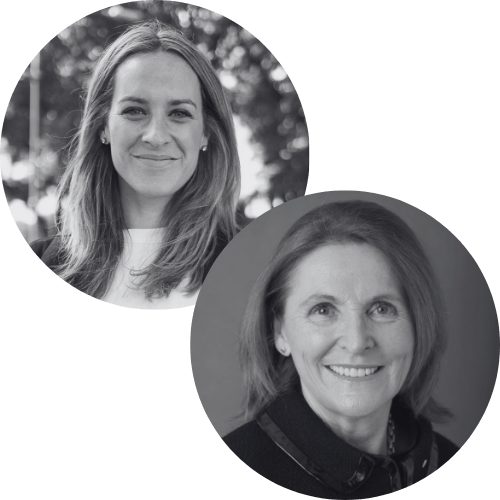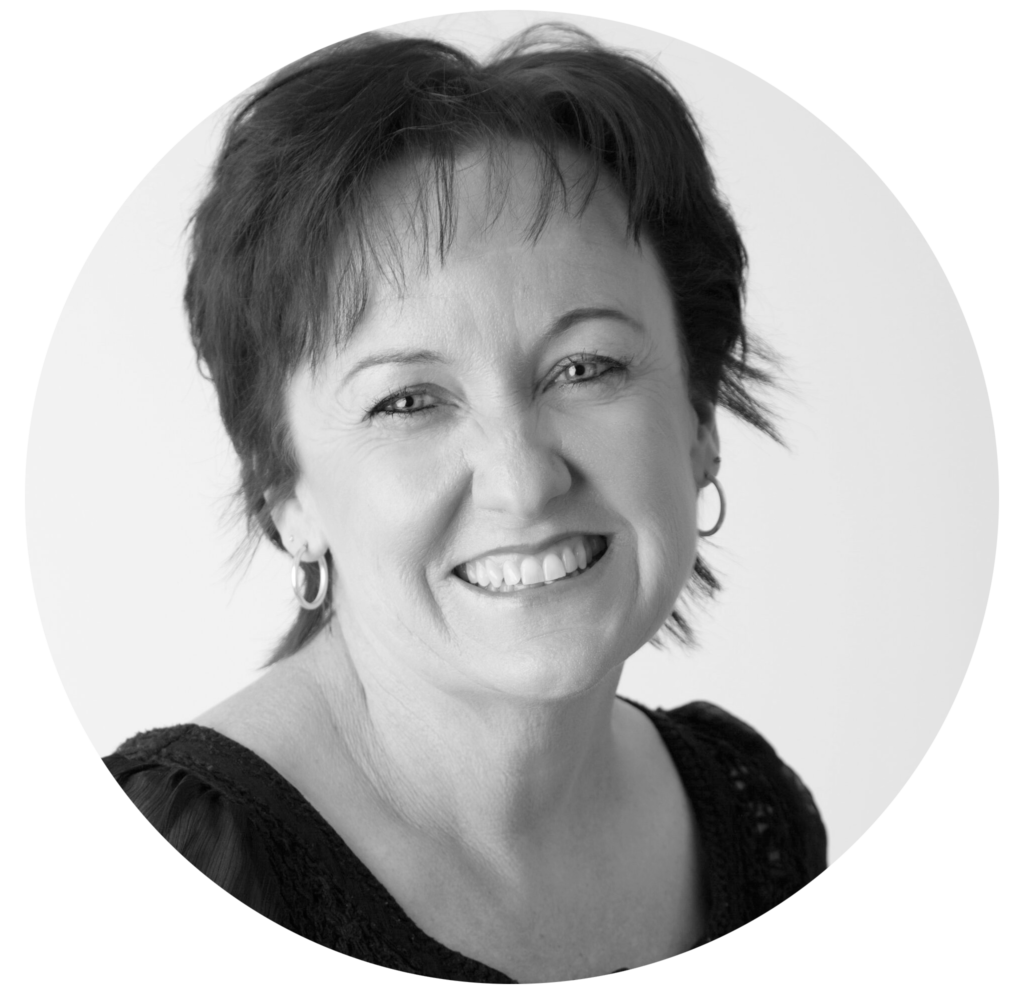Churches still can’t see past the tea and coffee roster when a woman in senior leadership in business or government joins their fellowship, participants in a webinar on women and the stained-glass ceiling heard this week.

Stephanie Judd and Wendy Simpson
Entrepreneur and company director Wendy Simpson identified a strange disconnect between the Christian community and society at large when it comes to women fulfilling their vocation.
“In most circumstances, the Christian community is behind what society’s doing,” said Wendy, a former ministerial adviser to the Victorian government and the first woman to run operations for air-freight company TNT.
“The Christian women leaders, the very senior women who are on boards, who are in vice-president roles, CEO roles, would say to me as they’ve gone through their professional career, they’ve been expected to step up and take on leadership roles … And yet they say, very sadly, that in some churches still, if they are new to the church, people will say, ‘Oh, that’s very nice. Thank you for coming to our church. Now look, we do have a roster for the tea and coffee and I’m just wondering if you would volunteer for that?’ They never assume that these women could be a leader in the marketplace or have a seat on the board. They don’t assume that the woman’s going to bring some professional skills, some high-level skills.
“I want to have that fulfilment of having a vocation. I want to see that God is integrated in everything I do.” – Wendy Simpson
“There’s this strange disconnect. [These women] think, ‘I want to be a Christian; I want to live my life. I want to have that fulfilment of having a vocation. I want to see that God is integrated in everything I do.’
“And then they go to a Christian group and people say, ‘Oh, she’s got a lot to say, hasn’t she? She wants to get involved in a lot of things. What’s all that about?’ So, the persona that women have been told is great and fabulous to have in their professional life is often misunderstood in the church. And I think that’s really sad.”

Karen Wilson
The webinar, hosted by Karl Faase of Olive Tree Media, also featured Stephanie Judd, Director of Ministry at City on a Hill in Melbourne, and Karen Wilson, CEO of the Global Leadership Network in Australia and New Zealand, Vice-President of Global Leadership Network International and President of the Baptist World Alliance Women.
“… We are asked to be quiet. We’re asked to be small. We’re asked to be less than.” – Karen Wilson
Karen, who said she had been a leader since early childhood, recalled a traumatic moment in her early ministry when a man asked her if she could just be “less.”
“I’m like, ‘Oh, OK, less than what?’ And I think it was less than the man that was asking me the question. I said, ‘Do you have an idea of how much less you’d like me to be?’ And he did. He said, 50 per cent.

Karl Faase
“I’m saying it quite lightly here, but at the time, it was really confronting. It meant whether I stayed in that role or not. He was saying, ‘Everything you do is just too big.’ But I thought, ‘You know what? I feel like if there was a man in that space, they’d be cheering him on to take over the world.’ You’re probably not surprised, but my answer was, ‘No, I can’t. I’m going to stand before God and say, ‘I did all I could with everything you asked me to do and everything in every way you created me.’
“But we are asked to be quiet. We’re asked to be small. We’re asked to be less than. It’s about where we fit alongside men who are comfortable and confident in their space. For us to find our space is quite difficult. But it depends on what men are in the room as well.”
Karen said it took her two years to get over that confrontation, but she realised that if she had given in to that demand, she would not have her current role overseeing women’s leadership networks across the NextGen and Asia Pacific.
“I walked around the river near our house and had to pray that through,” says Karen, who is based in Perth.
“But in this season I’m in now, I think, ‘What if I’d said yes to being less? What if I had just shown up in a smaller way? What if I didn’t use my voice when God asked me to? I certainly wouldn’t be in this space I am now. So I think honestly, if we can tough [it out] through those hard times, we grow, we learn from the bad as well as the good. Many women here today will say that years of pain have either strengthened them or broken them. And my prayer is that it strengthened us because we need men and women leading well together.”
Talking about the barriers and obstacles to women in leadership in the church, Stephanie Judd said she had to think long and hard about her church’s complementarian theology before working out her ministry roles.
“That was really important and that wasn’t like as soon as I became a Christian, all the theology in this space was clear,” said Stephanie, who has a key ministry role in City on a Hill’s flagship church.
“I’d encourage women seeking to be in ministry to spend that time to really work hard in understanding, ‘What do I believe about myself, my place, my church?’” – Stephanie Judd
“I had some sleepless nights. I realised that wherever I landed on these issues of what it looks like to be a woman in ministry and the church, was going to impact the rest of my life in ministry …
“So if I change my view about what I believe about a woman preaching on a Sunday, that impacts whether I’m on the [preaching] roster the next week or not – that’s different from my brothers in ministry. [I had to] recognise that and to be at peace with that, but also to do the work and to be willing to make changes and listen to God’s leading in that.
“I’d encourage women seeking to be in ministry to spend that time to work hard in understanding, ‘What do I believe about myself, my place, my church?'”
Stephanie said when she started at City on a Hill six years ago, she was the first theologically trained woman on staff.
“So often on Sunday, I was like, ‘Hey, how come we’ve got no women up front?’ And now, every week, we’ll have a woman service-leading, or giving a devotion, or working alongside our men upfront. It’s crazy to think that there was a time when sometimes we wouldn’t have a woman up front. That seems a different world away. So in six years, the culture has really grown, and we have a whole stack of women on staff.”
Stephanie advised women going into ministry to be prepared to talk about “women’s stuff” at least for the next five years.
“I never went into ministry thinking I want to be a champion for women. I want to teach the Bible. But what I have found is that being in ministry in this space and navigating change that does come, just be prepared for that. It might be a journey to make peace with that, but I’d encourage you to do that,” she said.
“And don’t stop focusing on the reasons why you go into ministry in the first place. Keep coming back to those foundations. For me, it was [the fact that] Jesus will return one day. He is going to bring his church with him, and he needs workers for the harvest field. And you can be that worker. So keep coming back to that; drinking from that well of living water is going to sustain you in challenging times and joyful times. Keep going deep with Jesus. That’s just the most important thing.”
“‘Did God make a mistake when he made me a leader and he made me a woman?’ My answer is no.” – Karen Wilson
Karen added that she had to test whether her theology matched her calling, “You have to search Scripture and say, ‘Did God make a mistake when he made me a leader and he made me a woman?’ My answer is no. But then you’ve got to reconcile that for the rest of your life.”
Agreeing with Karl Faase’s comment that even in complementarian churches, there are still plenty of opportunities for ministry beyond the morning tea roster, Karen said leadership is even possible for women in nations where it is culturally and politically unacceptable for them to lead.
“When I was travelling overseas, one of the young women said to me, ‘Do you think it’s possible that we could be leaders in our nation?’ And I said, ‘Do you think God made you a leader?’ She whispered, ‘Yes.’ And I said, ‘Well then, I think it’s possible.’
“That woman started a group in the capital city of that country that had 12 young women at its first meeting. When they met again three months later, there were 40 women. They made plans to meet together in a few weeks’ time – with a hundred women!
“It just takes one to have the courage to think, ‘I wonder if it’s possible?’ Even in cultures where females are shut down, God’s still at work. And he’s still asking us to step into those spaces and find a way that’s possible. It’s happened down through history.”
Looking at finding ways to overcome barriers to women in ministry, Karen said she hopes female leaders can be models for the next generation and mentor those that are coming through so that there won’t be a void. Her advice to women was to be bold but gracious.
For Stephanie, the key is having at least one woman, ideally two or more, in your church or team who are leading. They are then examples to other women of what it looks like for a woman to lead.
“Where are these women? There are a lot of these women out there, so keep searching if it’s not immediately clear to you.” – Stephanie Judd
She also wants to see men, as well as women, in positions of leadership empowering other women – “not just leaving it to women to empower women, particularly where there’s cultural change that’s desired.”
With an awakening to the need to have more women on boards, executive teams and faculties, there is a need to start mentoring women early in the pipeline, she said.
“Where are these women? There are a lot of these women out there, so keep searching if it’s not immediately clear to you. But the other thing is that, if there aren’t women around with the expertise you’re looking for, it’s a sign that we need to start earlier in the pipeline. To have excellent people [we need to] invest in youth and young adults, putting them on the front lines of ministry earlier, training and recruiting men and women because that’s going to be our next generation of leaders.”
Wendy Simpson used the analogy of planting your own trees.
“One of the challenges for Christian organisations is that often they don’t do anything to develop the women leaders, and then they look around at the accounting profession, the legal profession, and they say, ‘Oh, look at that woman there; she’s got some very interesting skills.’ And they say, ‘Oh, we’ll just go and invite her to be part of our organisation.’ I’d say, ‘Well, that’s eating someone else’s fruit. You haven’t done anything in your own organisation. You haven’t been building up leadership pathways for your own young women. So I don’t think that’s appropriate. I call it eating someone else’s fruit. So plant your own trees.”
Karen said there was a need to identify women in your spheres of connection, then equip them, empower them and release them so that they have an impact.
“We want to be mobilised for good, and we want to make a difference. It’s innately who we are … In my world, I’m having men champion this even more than women. So that’s exciting. They’re funding it, they’re resourcing it, they’re saying, ‘It’s time, let’s go.’ So it’s quite a thrilling season for me.”
Stephanie encouraged women in ministry to keep going.
“The church needs you. God’s given you gifts. He’s given you experiences. And we see from the Bible, regardless of where you stand on the kind of complementarian/ egalitarian front, that God has designed men and women in unity to serve on his mission. And so if you are not contributing, then the church has a limp. It’s missing out. The church needs you, so keep going.
“I also want to say, particularly to some women who might be feeling isolated or the one woman in a male-dominant environment, that you’re not alone. There are lots of women out there who are supporting you, cheering you on, pleased that you’re doing what you’re doing, experiencing a lot of the same things that you are. It’s good to remember that and draw on other women who can support you, pray for you, and draw on good male friends who will champion you and support you in what you’re doing. That is really key.”
If you would like to watch the webinar, you can do so here.
Email This Story
Why not send this to a friend?



